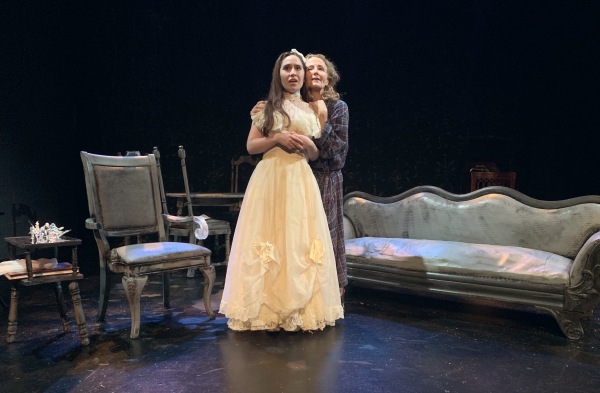With its simple narrative, The Glass Menagerie has always lent itself to reinterpretation. For those unfamiliar with the Tennessee William’s classic, the play centers on the Wingfield family. Many years before the opening scene, Mr. Winfield abandoned his wife Amanda and their two children Laura and Tom, now in their 20s. A former Southern belle who proclaims to have had a fleet of suiters, the socially skillful Amanda is overly focused on her children and the molding of their lives. Having suffered childhood illness, Laura is so painfully shy she has no friends or career prospects. Her one joy is her collection of glass animals. Tom has had to set aside his dream of being a writer and works at a shoe warehouse in order to pay rent on their shabby St. Louis apartment. Amanda is determined to find a suitable husband for Laura in order to provide for their future and perhaps free Tom for a better life.
Told from Tom’s viewpoint and relayed as his recollection of events, The Glass Menagerie is referred to as a memory play. Tom himself cautions the audience that what they see may not be precisely what happened. Plot points are therefore more representational than factual. The much anticipated visit from the Gentlemen Caller who may sweep Laura away can stand in for any elusive wish. Laura’s much discussed disability is represented as a psychological wound as often as it is depicted with a physical leg brace.
In the current iteration staged by Austin Pendleton and Peter Bloch, the recurring theme of illusion takes center stage. It is emphasized in Tom’s love of movies, Amanda’s revisionist past, and Laura’s hazy self-image. The piece opens with Tom performing slight of hand. Many props remain illusionary, with the entire cast miming everyday actions such as drinking coffee and smoking a cigarette in an intentionally unrealistic manner. The essential Gentleman Caller’s visit seemingly haunts the lives of the family, hanging over the room as fully as the father’s portrait which stares down from the back wall.

Alexandra Rose and Ginger Grace in Glass Menagerie at The Wild Project
While it is an intriguing approach, the production’s gauziness makes it difficult to latch on to the characters. The relationships feel flattened by their hallucinatory essence. As is described in the script, Gentleman Caller Jim is the most three dimensional, brought to appealing life by Spencer Scott. But the other performers are left nearly bloodless. Pendleton/Bloch collaborator Matt de Rogatis’s Tom shows brief flashes of frustration. When he is downstage speaking directly to us, Amanda and Laura are often upstage as if in his thought bubble. But he too is sometimes crammed upstage and many of his character-defining moments are therefore obscured. Frequently placed behind a scrim literally separated from everyone and cloaked in shadows, this Laura (a single-noted Alexandra Rose) floats like a phantom through her scenes. Most significantly Amanda (a fiery Ginger Grace ) is strongest when she is alone on stage, leveraging what’s left of her Southern charm to sell magazine subscriptions.
The deliberate ghostlike features work far better as an integral part of the production design. Steven Wolf’s lights are initially neatly focused on Laura’s collection of glass animals, slowly broadening to reveal the tattered set. Gothic furniture designed by Jessie Bonaventure is missing limbs and top off with glass elements lending them an air of incompleteness. The father who abandoned his wife and children eerily looms over their plight in a large photographic projection. Sean Hagerty original haunting music from unseen dance halls along with discomforting sounds effects orchestrated by Allison Hohman emphasize the nature of memory and complete the spectral landscape.
A curiosity best suited to fans of the play, The Glass Menagerie is running at The Wild Project (195 East 3rd Street, between Avenues A & B) though October 20. Runtime is 1 hour and 45 minutes without an intermission. Tickets are $35 and are available through Brown Paper Tickets at 1-800-838-3006 or by visiting www.theglassmenagerieplay.com.
